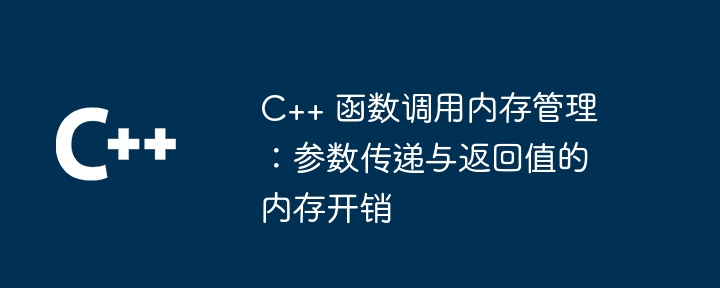Home >Backend Development >C++ >C++ function call memory management: memory overhead of parameter passing and return value
C++ function call memory management: memory overhead of parameter passing and return value
- 王林Original
- 2024-04-30 18:12:01428browse
C function calls involve parameter passing and return values, which will generate memory overhead. Parameter passing is by value or by reference, passing by value copies the parameter, and passing by reference points to the original parameter. The return value is returned by value or by reference, return by value saves the return value, and return by reference points to the original value. Pass-by-reference and return-by-reference generally have less memory overhead because they do not create copies.

C Function call memory management: memory overhead of parameter passing and return value
In C programs, function calls involve Parameter passing and return values, which incur memory overhead. Understanding these memory overheads is critical to optimizing program performance.
Parameter passing
C supports passing by value and passing by reference. Passing by value makes a copy of the parameter, while passing by reference does not.
-
Pass by value: A copy of the argument is created when the function is called. This copy is saved on the stack and destroyed after the function returns. The memory overhead is equal to the size of the parameters.
void fn(int x) { // x 是参数副本 } -
Pass by reference: References to parameters are created when the function is called. The reference points to the original parameter, so no copy is created. The memory overhead is the size of the pointer or reference, which is usually much smaller than the size of the argument.
void fn(int& x) { // x 是参数引用 }
Return value
Function can return a value or reference. The memory overhead of the return value depends on its type.
-
Return by value: The return value is saved on the stack and destroyed after the function is called. The memory overhead is equal to the size of the return value.
int fn() { return 5; // 返回一个整型值 } -
Return by reference: The return value points to the original value, so no copy is created. The memory overhead is the size of the pointer or reference.
int& fn() { static int x = 5; return x; // 返回 x 的引用 }
Practical case
Consider the following code:
#include <iostream>
void print(int n) { // 按值传递
std::cout << n << std::endl;
}
void printRef(int& n) { // 按引用传递
std::cout << n << std::endl;
}
int main() {
int x = 5;
print(x); // 按值传递
printRef(x); // 按引用传递
return 0;
}-
print(x)When called, a copy of the argumentxis passed to the function, with a memory overhead ofsizeof(int). -
printRef(x)When called, the reference of the parameterxis passed to the function, and the memory overhead issizeof(int*)(that is, the pointer size ).
In practice, pass-by-reference is often used to pass large objects to avoid expensive copy operations.
The above is the detailed content of C++ function call memory management: memory overhead of parameter passing and return value. For more information, please follow other related articles on the PHP Chinese website!

